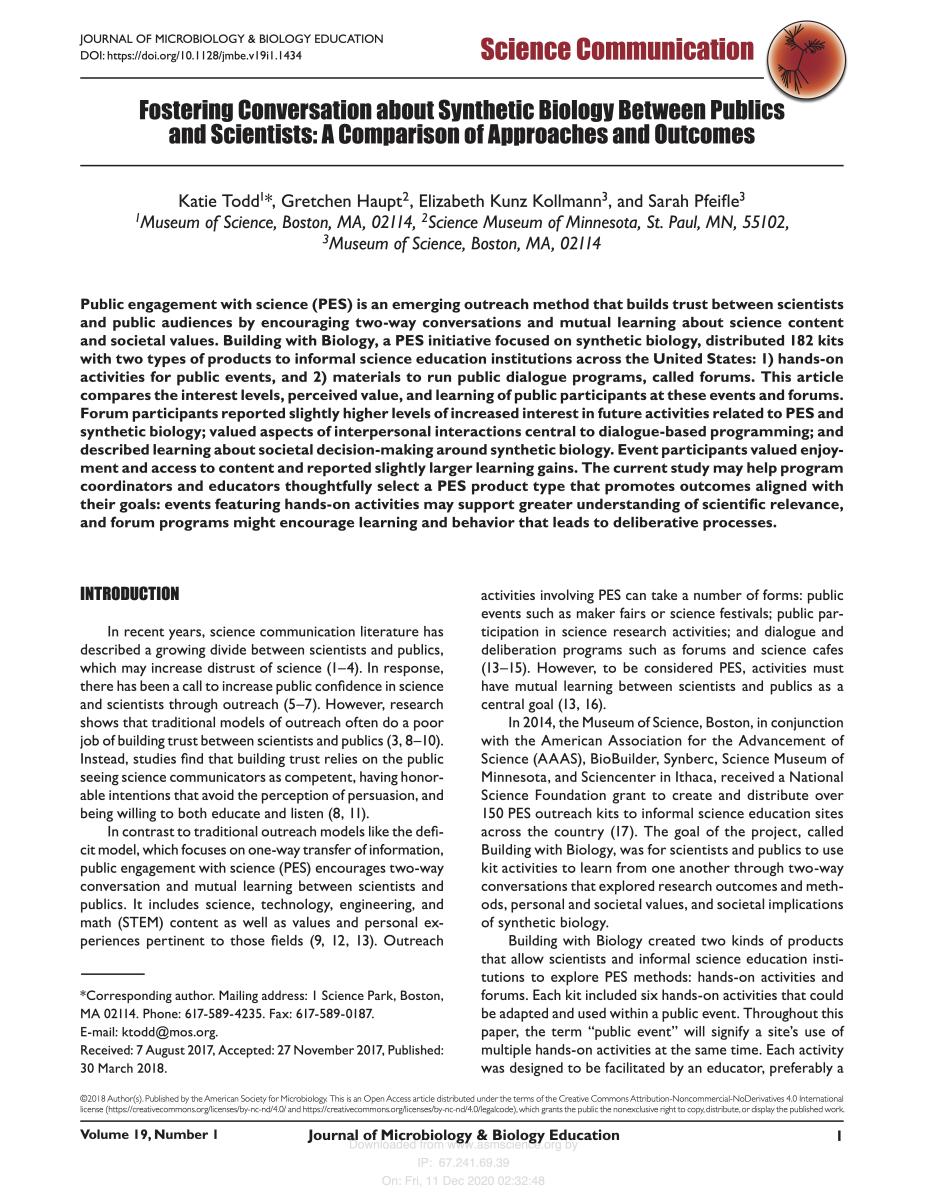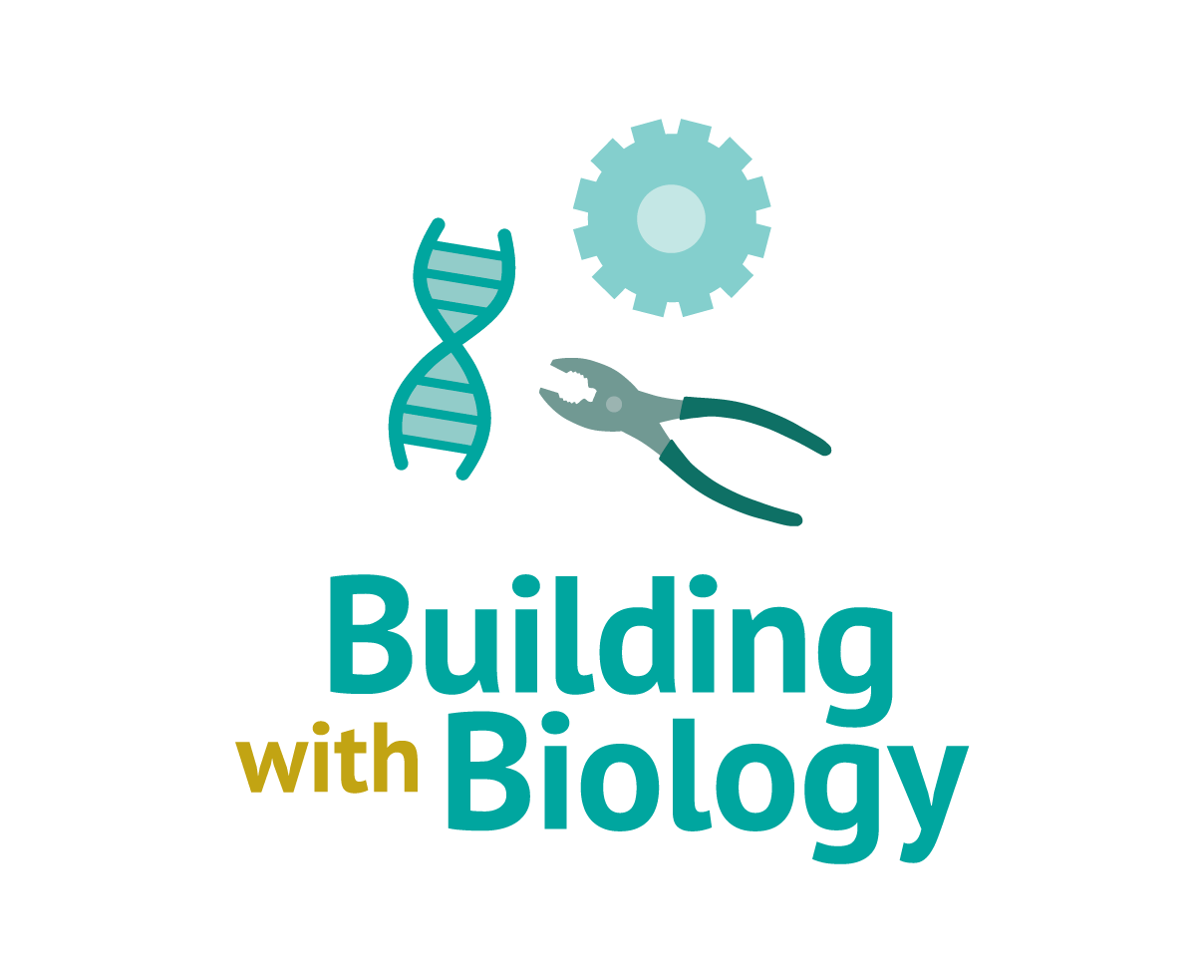DESCRIPTION
Published in the Journal of Microbiology & Biology Education, Fostering Conversation about Synthetic Biology Between Publics and Scientists: A Comparison of Approaches and Outcomes is an article that highlights Building with Biology project outcomes.
Abstract: Public engagement with science (PES) is an emerging outreach method that builds trust between scientists and public audiences by encouraging two-way conversations and mutual learning about science content and societal values. Building with Biology, a PES initiative focused on synthetic biology, distributed 182 kits with two types of products to informal science education institutions across the United States: 1) hands-on activities for public events, and 2) materials to run public dialogue programs, called forums. This article compares the interest levels, perceived value, and learning of public participants at these events and forums. Forum participants reported slightly higher levels of increased interest in future activities related to PES and synthetic biology; valued aspects of interpersonal interactions central to dialogue-based programming; and described learning about societal decision-making around synthetic biology. Event participants valued enjoyment and access to content and reported slightly larger learning gains. The current study may help program coordinators and educators thoughtfully select a PES product type that promotes outcomes aligned with their goals: events featuring hands-on activities may support greater understanding of scientific relevance, and forum programs might encourage learning and behavior that leads to deliberative processes.
Authors:
Katie Todd, Museum of Science, Boston, MA; Gretchen Haupt, Science Museum of Minnesota, St. Paul, MN; Elizabeth Kunz Kollmann, Museum of Science, Boston, MA; and Sarah Pfeifle, Museum of Science, Boston, MA
Citation:
Todd K, Haupt G, Kollmann E, Pfeifle S. 2018. Fostering conversation about synthetic biology between publics and scientists: a comparison of approaches and outcomes. J. Microbiol. Biol. Educ. 19(1): doi:10.1128/jmbe.v19i1.1434
DESCRIPTION
Published in the Journal of Microbiology & Biology Education, Fostering Conversation about Synthetic Biology Between Publics and Scientists: A Comparison of Approaches and Outcomes is an article that highlights Building with Biology project outcomes.
Abstract: Public engagement with science (PES) is an emerging outreach method that builds trust between scientists and public audiences by encouraging two-way conversations and mutual learning about science content and societal values. Building with Biology, a PES initiative focused on synthetic biology, distributed 182 kits with two types of products to informal science education institutions across the United States: 1) hands-on activities for public events, and 2) materials to run public dialogue programs, called forums. This article compares the interest levels, perceived value, and learning of public participants at these events and forums. Forum participants reported slightly higher levels of increased interest in future activities related to PES and synthetic biology; valued aspects of interpersonal interactions central to dialogue-based programming; and described learning about societal decision-making around synthetic biology. Event participants valued enjoyment and access to content and reported slightly larger learning gains. The current study may help program coordinators and educators thoughtfully select a PES product type that promotes outcomes aligned with their goals: events featuring hands-on activities may support greater understanding of scientific relevance, and forum programs might encourage learning and behavior that leads to deliberative processes.
Authors:
Katie Todd, Museum of Science, Boston, MA; Gretchen Haupt, Science Museum of Minnesota, St. Paul, MN; Elizabeth Kunz Kollmann, Museum of Science, Boston, MA; and Sarah Pfeifle, Museum of Science, Boston, MA
Citation:
Todd K, Haupt G, Kollmann E, Pfeifle S. 2018. Fostering conversation about synthetic biology between publics and scientists: a comparison of approaches and outcomes. J. Microbiol. Biol. Educ. 19(1): doi:10.1128/jmbe.v19i1.1434
Credits
Museum of Science
This material is based upon work supported by the National Science Foundation under Grant Number DRL 1421179. Any opinions, findings, and conclusions expressed in this material are those of the authors and do not necessarily reflect the views of the National Science Foundation.
Creative Commons Attribution Non-Commercial Share Alike 3.0 United States (CC BY-NC-SA 3.0 US).
View more details

NISE Network products are developed through an iterative collaborative process that includes scientific review, peer review, and visitor evaluation in accordance with an inclusive audiences approach. Products are designed to be easily edited and adapted for different audiences under a Creative Commons Attribution Non-Commercial Share Alike license. To learn more, visit our Development Process page.


